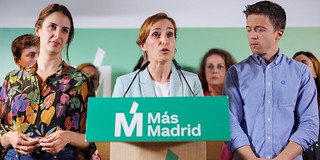The three most likely scenarios in Spain after the general elections of July 23
This Sunday, July 23, millions of Spaniards of legal age are called to vote in a general election.
These elections are full of uncertainty, although almost all polls have predicted a defeat for the left. Starting from this base, there could be three very probable scenarios after the elections according to the latest polls.
1. Victory for the PP but without an absolute majority of the center-right
If the Popular Party (PP) and Vox fail to add the necessary seats to form an absolute majority (176), we would have a very unstable political situation. If the PP had more votes than the PSOE, and even if it achieved the abstention of the Socialists to govern, the resulting government could face a vote of no confidence at any time. It is also possible that the PP does not achieve the necessary support and abstentions and we will go to new elections in a few months.
In that case, it is possible that the PSOE would try to stay in government with the support of the separatists and the extreme left, but Pedro Sánchez would have to pay an even higher price for governing than in the previous legislature, which would lead to a break with the current constitutional framework. In fact, a few days ago, the separatist partners of the PSOE have already announced "self-determination referendums" in Catalonia and the Community Vasca, that is, a new attempt to break the unity of Spain, an attempt that would be favored by a very weak government and hostage to the rupturists, and by the repeal of the crime of sedition by Sánchez.
2. A government of absolute majority with the PP and Vox
This would be the possible scenario if the PP and Vox manage to add 176 seats or more, and if Vox maintains or increases its seats and the PP does not reach the goal of al less than 150 seats that Feijóo set for himself, but it exceeds the seats of the PSOE. The possibility of a coalition government would be very likely if the PP seats fail to exceed the sum of the PSOE and Sumar seats. The PP and Vox would have to agree on a government program, which will not be easy, since both parties have very different approaches. If they succeed, we would be facing a scenario that could lead to a real change of direction in Spain.
3. A PP government without an absolute majority and without Vox
It would be the formula that the PP would seek if it manages to exceed 150 seats and Vox loses part of its current seats. In that case, it is likely that the PP will desperately seek the abstention of the PSOE and the support of the PNV separatists , which would close the possibility that Vox would support a Feijóo government.
In that case, we would have an unstable government, hostage to the PSOE and the PNV and incapable of changing anything except with the support of Vox, a support that would endanger the support of the PNV and the "permission" of the PSOE for Feijóo to govern. Possibly, given this situation, Feijóo would be pushed to call new elections in the medium term, to seek the long-awaited absolute majority for the PP without the necessary time passing for PP voters to feel disappointed and begin to choose to vote for Vox.
Three other scenarios that are highly unlikely
It is the scenario that would occur if the PP had 176 seats or more. In this case, the PP would not need the support of anyone to govern and we would have a very stable government, although taking into account the precedent of the Rajoy government by absolute majority (2011-2015), it is unlikely that the PP would repeal the ideological laws of the left, so more than a change of course, we would have a change of acronyms and people in the government, and little else. It is a very unlikely scenario.
It is the situation that would occur if the PP and Vox managed to add more than 176 seats and the PSOE obtained more seats than the PP. Feijóo offered a pact for Sánchez to govern the list with the most votes. Although Sánchez refused to sign that commitment, Feijóo may not want to govern in that case. The pressure that the PP would receive from its own regional leaders and their related media to forget about the pact would be enormous. One wonders what Feijóo will do in that case. In any case, only the CIS -which has lost all its credibility as a demographic center- has indicated a possible victory for the PSOE.
Finally, there is another remote possibility of a victory for the PSOE but without an absolute majority of the center-right. In this case we would be in a situation very similar to scenario number 1. In any case, only the CIS has raised a possible victory for the PSOE. I excuse myself from raising the possibility of a PSOE government by absolute majority, since no survey even remotely points to such a case.
The only valid survey is the one that is done today
With that said, I want to caution that the probabilities I point to in these scenarios depend on what the polls indicate. But the only valid poll is the one that Spaniards will take today when they go to vote, and it would not be the first time that electoral polls are wrong. If some of these scenarios do not convince you, it is in your power to help prevent it from happening, by going to the polling station to exercise your right to vote. Don't let others decide for you what will happen.
---
Photo: Congreso de los Diputados.
|
Don't miss the news and content that interest you. Receive the free daily newsletter in your email: Click here to subscribe |
- Most read
- Russia boasts of its army using the image of a Spanish Leopard 2E tank
- Seven months later the United Nations admits that Hamas publishes false death tolls
- The deployment of military helicopters from Spain and other allied countries in Romania
- Shameful censorship: Israeli singer Eden Golan's lyrics banned by Eurovision
- The genocides that the left-wing does not protest while slandering Israel
- The ten oldest national flags in the world that are still in use today
- Five examples that portray the extreme left that “is not anti-Semitic, but”

 ES
ES





Opina sobre esta entrada: